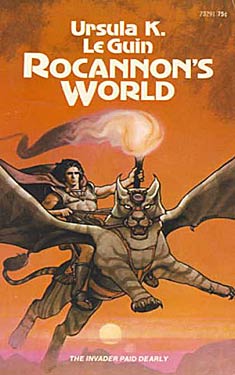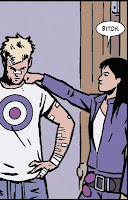Last week, my fellow Scribblerati Agent Shawn posted a
few suggestions for your reading enjoyment. One was for the comic book
Hawkeye written by Matt Fraction and drawn by David Aja, it's a recommendation that I heartily agree with. In fact, it was the forgotten 14th book in a blog of my own:
13 comics in '13. Shawn talked about it a little bit, so I'll be brief.
Hawkeye is a great book.
It's funny and smart with some fantastic art. It manages to easily walk the line between portraying the serious danger permeating the life of an off-duty Avenger and reveling in the misadventures of a man who is part good-hearted hero and part screw-up.
Now, I'm not one to rail against mainstream superhero books. I don't see the point. I'm not a fan of some of the more annoying and long ingrained tropes, but I still understand that the industry is what the industry is. I mean, you should know what you're buying before you buy it. If you don't like certain things, do like me and don't support them with your money... simple enough. But at the same time, I love books like this, books that stretch and explore and try new things. Simply put, there should be more books like this on the shelf. Books with substance and wit, y'know? Granted, Hawkeye is a character that may not sound like an interesting read at first glance, but it is absolutely a book you should be picking up. It deserves the support.
Here's some samples to give you a taste:
This is hands-down a great book. I love it. Well written. Fantastic art. Excellent pacing and balance of tone. Lots of fun. Definitely worth a buy.
Next up is a comic that I wasn't expecting to like.
Avengers Arena.
I mentioned it in the
13 comics in '13 blog, as well. For the click-lazy, the story goes like this: There's this old X-men bad guy called Arcade. He's a little red-headed twerp in a white suit and bow-tie who specializes in creating these elaborate and nightmarish theme parks he calls Murderworlds that are designed to kill superheroes. He then lures the X-men or the Avengers into the middle of one of these ridiculously stupid, Rube Goldbergian death-traps, all while cackling wildly.
Unfortunately for him, he's a big failure. None of his intended victims have ever had any trouble at all busting out of one of his stupid traps, let alone actually come close to dying in one. Never once. Not once. He usually just ends up getting the unholy crap somewhat deservedly kicked out of him. The guy is D-list all the way. A total nothing villain. A joke.
Idiot
Or at least he was...
Because Arcade is back and he's done some work on himself while he was away. He has upgraded his tech and changed the rules of his game. Now, within his new Murderworld, he is all-powerful.
His first target: Teen Superheroes.
"Wait a minute," I hear you saying... "You just go on and hold on there a minute,
Jon, you're not talking to some rube here, you are talking to someone who has devoured the latest and greatest new hotness in "literature" these days and I gotta tell ya', this stuff here sounds like nothing more than a Hunger Games rip-off." And you'd be right, Senor English Lit Major... kind of (except for the fact that it's more of a Battle Royale rip-off and so is Hunger Games, both of which owe a huge debt to Lord of the Flies... ahem... but I digress), but the kicker is: The creators are also aware of the similarities. I mean: Duh. Come on. Here's some sample covers...




So they know. It's not a big thing. Anyway, I haven't read anything else by Dennis Hopeless and I'm pretty sure I haven't seen any of Kev Walker's work before either, but let me tell you, they're killing it. Walker's work is expressive and fluid with strong, dark lines, not overly concerned with muscle poses or relying heavily on sexy. I really like it, especially for this book. But the real sell is Hopeless's writing. I mean, really, the key to pulling off a book like this, using a topic like this, featuring a villain who has never been a threat, is to make it all matter. You have to make it dangerous. In a nutshell, Murderworld has to kill the hell out of some characters.
And it does...
SPOILERS:
END SPOILERS...
The best part is that all of the characters trapped within this new Murderworld are heroes or heroes-in-training and as the story progresses, slowly but surely, Arcade is forcing them to play his game. Blood has been spilled. There's twists and danger on every page.
And it doesn't take long to realize that no one is safe.
Which is surprising because some of the cast has appeared in other books before. There's members of the Runaways and the Avengers Academy present, among others, so you kind of expect them to be safe... but believe me, they are not.
Along with these established characters, there are some brand new ones too, not that you can tell when reading--a testament to the writing. Each new issue focuses on a different cast member, it introduces them, it lets you get to know them, it makes them a real character with actual motivations... and then...sometimes, it kills them off, often shockingly. Arcade's game isn't over until there's only one hero left and at this point, I'm not entirely unsure that is what will actually end up happening. That's brilliant. Do you know how many Big Two comics there are out there where a character could actually die in a non-Event book? And have it matter?
None.
Now, some people out there will complain about this. Comic fans are notoriously resistant to any kind of change in the status quo at all, while often at the same time bitching about the lack of tension in stories... it's a difficult crowd to please to say the least. I don't get it. To me, the danger is what makes it thrilling. Sad, of course, because due to the strong writing you end up liking a lot of these characters, flaws and all, but it's a thrilling read nonetheless.
And that's why Avengers Arena is highly recommended.
Read on,
Jon
























